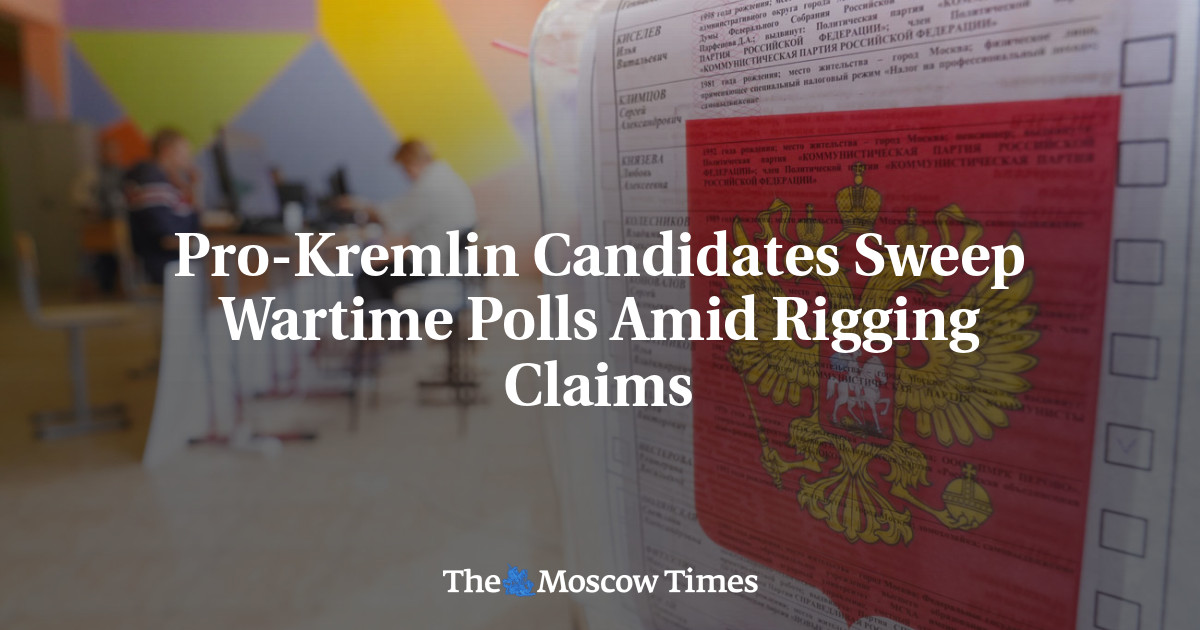
Pro-Kremlin candidates swept the field in Russia’s local and regional elections over the weekend, the first since the country invaded Ukraine, according to preliminary results published Monday.
Already overshadowed by the arrests or disqualification of opposition politicians as well as wartime censorship laws, Russia’s 2022 elections were further marred by claims of fraud over the three days they were held.
The independent elections watchdog Golos recorded cases of ballot-stuffing, intimidation, vote buying, misrecorded votes and other forms of manipulation that critics claim the Kremlin uses to rig the results.
Local media reported that some ballots had been destroyed with “small, pre-printed” dots in a checkbox next to the ruling, pro-Kremlin United Russia party.
Overall, Golos recorded more than 1,700 reports of violations during the nationwide vote. Russia’s Central Election Commission said it received 93 reports throughout the three-day election.
Election monitors widely criticized Russia’s “at-home” voting system that allowed eligible voters to cast their ballots outside polling stations, Golos said.
The watchdog said it received widespread reports of voters being turned away from polling stations because they had been registered as having cast their ballots online. Eight Russian regions including Moscow incorporated online voting, which opponents criticize as prone to falsifications due to its lack of transparency.
Sergei Mironov, head of the A Just Russia party and an opponent of online voting, posted a video of himself being unable to vote Sunday due to what he described as his “forced transfer” to remote voting.
Russia first introduced three-day voting periods in 2020 in a bid to keep Covid-19 transmissions low. Critics of the system say that extending voting beyond a single day makes instances of electoral fraud more likely to happen.
Golos over the weekend reported election monitors being banned from filming the voting process, removed from polling stations and in some cases arrested.
At least 30 people, including monitors, candidates and electoral commission members, have been detained in connection with the nationwide vote Sunday, the police monitoring watchdog OVD-Info said.
With the groundwork laid for pro-Kremlin victories, Russia’s three-day voting period saw no dramatic upsets.
Every incumbent governor on the ballot was leading their respective race by a wide margin as of early Monday, according to preliminary results.
United Russia party candidates meanwhile won 1,100 of 1,417 municipal council seats in Moscow, according to the state-run TASS news agency. Nearly 34% of eligible voters turned out in the Russian capital, almost triple the turnout of the previous municipal elections there in 2017.
More than 1 million more Muscovites cast their ballots online (1.7 million) than at polling stations (695,000), according to the election commission.
Russia’s election chief Ella Pamfilova urged local commissions to publish results after Wednesday so that “violations are carefully considered.”
Jailed opposition leader Alexei Navalny’s team had urged Moscow-based supporters to use his “Smart Voting” strategy to vote for candidates most likely to upset United Russia frontrunners and voice their tacit opposition to the Ukraine invasion. Russian authorities had blocked access to the “Smart Voting” website, leaving the list of 778 “anti-war” candidates accessible only through a smartphone app or a VPN.
“Any action aimed at weakening any element of Putin’s system is right and a citizen’s duty,” Navalny, whose political and fundraising organizations were banned as “extremist” last year, said in a tweet from prison last week.
The Kremlin said later Monday that the pro-Kremlin candidates’ decisive victories signaled Russian voters’ support for the Ukraine invasion.